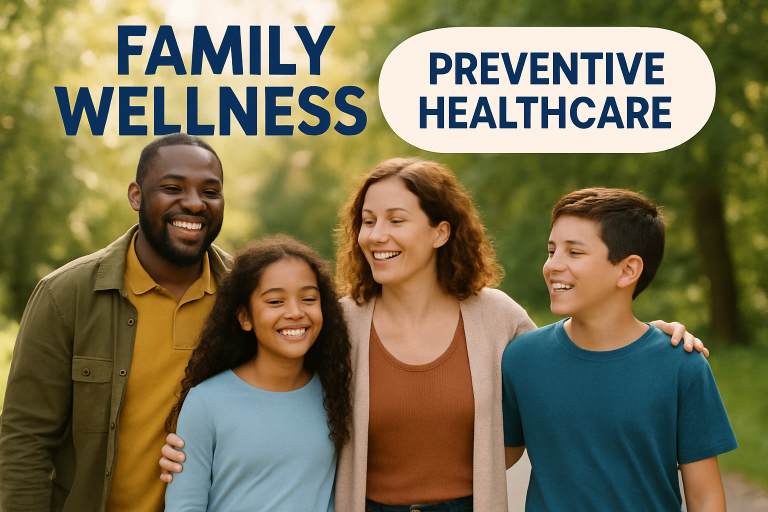Table of Contents
- Introduction
- Regular Health Check-ups and Screenings
- Importance of Vaccinations
- Healthy Lifestyle Choices
- Mental Health Awareness
- Creating a Safe Home Environment
- Educational Programs and Resources
- Leveraging Technology for Health Monitoring
- Community Support and Resources
Introduction
Preventive healthcare is the cornerstone of lifelong wellness for families. Taking proactive steps to minimize health risks boosts overall quality of life and helps avoid the onset of many chronic conditions. Families can support every member's health journey by prioritizing regular health check-ups, vaccinations, healthy routines, and a safe home environment. Connecting with a trusted primary care physician Rock Hill can also ensure your family receives prompt and personalized guidance for preventive care.
Developing preventive health strategies is a collective effort emphasizing physical and mental well-being. Daily habits, such as eating nutritious foods and staying physically active, play just as vital a role as timely vaccines and routine screenings. Furthermore, integrating technology and community support resources can provide families with the tools and networks necessary to thrive.
- Regular health check-ups and screenings are essential for early detection of potential health issues.
- Vaccinations play a crucial role in protecting against various infectious diseases.
- Healthy lifestyle choices, including balanced nutrition and regular physical activity, are fundamental to disease prevention.
- Mental health is as important as physical health; addressing stress and emotional well-being is vital.
- Creating a safe home environment helps prevent accidents and exposure to harmful substances.
Families can further boost their preventive healthcare efforts by visiting a local medical clinic for specialized services and resources. Many clinics also host educational workshops and screening events that support long-term family health.

Regular Health Check-ups and Screenings
Routine medical exams are the foundation of preventive care, giving families an opportunity to identify and address health issues before they escalate. Children benefit from developmental assessments, while adults should track blood pressure, cholesterol, and other vital markers. These screenings make it possible to catch risk factors for chronic conditions like diabetes and heart disease early, ensuring the best chance for successful management or prevention. According to the Centers for Disease Control and Prevention (CDC), regular screenings lead to higher survival rates and a better quality of life.
Importance of Vaccinations
Vaccinations provide critical protection against contagious diseases, safeguarding individuals and entire communities. Staying up-to-date with immunizations prevents measles, whooping cough, and influenza outbreaks. Following the recommended schedule for children and adults, as laid out by your healthcare provider, helps maintain herd immunity and shields vulnerable populations like infants and the elderly. Refer to the World Health Organization (WHO) for more detailed vaccine recommendations.
Healthy Lifestyle Choices
Nutrition
Nutritious, balanced meals are vital for preventing various diseases and fostering overall development—especially for children. Prioritizing fruits, vegetables, whole grains, and lean proteins optimizes the immune system and reduces the risk of conditions like obesity and diabetes. Meal planning as a family can be a fun way to learn about nutrition and make better choices.
Physical Activity
Regular physical activity enhances cardiovascular health, regulates mood, and supports a healthy weight. The American Heart Association recommends at least 150 minutes of moderate exercise per week for adults and daily activity for children. Activities like walking, biking, or playing sports together encourage family bonding and positive lifestyle habits.
Mental Health Awareness
Mental health is closely linked to physical health—it impacts how families function and cope with everyday challenges. Open dialogues about stress, anxiety, and emotional struggles help break down stigmas, making it easier to seek help when needed. Educational resources, therapy, and community support are all valuable for families managing mental health concerns. Schools and workplaces may also provide toolkits and workshops to foster emotional resilience in children and adults alike.
Creating a Safe Home Environment
A secure, hazard-free home is essential to prevent accidental injuries and promote family well-being. Safety measures include anchoring heavy furniture, installing smoke and carbon monoxide detectors, and ensuring all cleaning products are stored out of reach of children. Regular home safety reviews and first-aid preparedness effectively minimize household risks.
Educational Programs and Resources
Participating in reputable health education programs gives families the skills and knowledge to make informed decisions. Many schools, community centers, and healthcare facilities offer tailored workshops covering nutrition, exercise, and mental health. These programs often extend support through printed materials, online platforms, and multimedia campaigns that engage all age groups.
Leveraging Technology for Health Monitoring
Health apps and wearable technology simplify monitoring daily habits, vital signs, and fitness progress. Devices can track steps, heart rate, and sleep patterns, making it easier to identify potential health issues early. In addition, telemedicine platforms provide instant access to healthcare providers, reducing wait times and increasing convenience for busy families.
Community Support and Resources
Community clinics, public health organizations, and local fitness groups support families interested in preventive care. These resources often offer free educational seminars, group fitness activities, and routine health screenings. Forming connections within your community also strengthens your family’s social network and encourages shared accountability for wellness goals.
Families can safeguard physical, emotional, and environmental health through a comprehensive, proactive approach to prevention. Engaging primary care providers, leveraging educational programs, and utilizing the latest health technologies all contribute to a stronger, healthier family unit.



No comments:
Post a Comment
I love reading and responding to comments but in order to get my reply you must ensure you are NOT a no-reply blogger. If you are, here are some quick steps to change that!
1. Go to the home page of your Blogger account.
2. Select the drop down beside your name on the top right corner and choose Blogger Profile.
3. Select Edit Profile at the top right.
4. Select the Show My Email Address box.
5. Hit Save Profile.